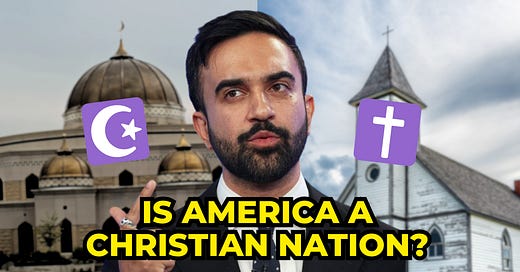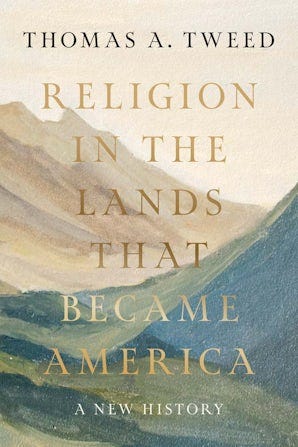The question "Is America a Christian nation?" took on renewed urgency last night as Zohran Mamdani won New York City's Democratic mayoral primary, positioning him to become the city's first Muslim and Indian American mayor. The immediate backlash was swift and telling: Charlie Kirk invoked 9/11, tweeting that "24 years ago a group of Muslims killed 2,753 people" and now "a Muslim Socialist is on pace to run New York City." Patrick Bet-David warned that "Sharia Law is the end goal. NYC is just the opening move."
These reactions reveal how the question of America's religious identity continues to shape our politics and social discourse. But what does history tell us about whether America is—or was ever intended to be—a Christian nation?
In this wide-ranging conversation, Professor Thomas A. Tweed from the University of Notre Dame, author of "Religion and the Lands That Became America," offers a historian's nuanced perspective (if interested, you can purchase his book using my affiliate link here, which supports this newsletter and local bookshops). Drawing from archaeological evidence dating back 11,000 years and the remarkable religious diversity that existed even at America's founding in 1776, Tweed challenges the narrow narratives that fuel today's Christian nationalist movement.
In this recorded live conversation, we explore everything from the Founding Fathers' complex theology to the rise of megachurch culture, from Islamic practices on plantations to Buddhist influence on modern American spirituality, a more complicated picture emerges. It suggests the current backlash to Mamdani's victory misunderstands both America's past and its founding principles.
Why I NEED You
Here's the brutal truth: bringing real religious scholars to discuss America's complex spiritual history is expensive. Getting experts like Professor Tweed costs money (not to pay them directly, but for the overhead production and coordination work), finding academics willing to engage in public discourse takes effort, and creating content that actually educates rather than inflames requires resources that most independent creators simply don't have.
The religious discourse landscape is completely poisoned. Social media algorithms push whatever gets the most engagement, usually the most divisive takes about "Christian nationalism" or "Muslim threats" that confirm what people already believe. Independent voices like mine are constantly fighting against platforms that suppress nuanced religious discussions in favor of culture war content.
But less than 4% of my readers are paid subscribers.
That makes it nearly impossible to do the deep, expert-driven religious journalism this moment desperately needs. While mainstream outlets are booking partisan pastors and political pundits to discuss America's religious identity, I'm trying to bring you actual historians and scholars who've spent decades studying these issues.
But I do this alone.
📚 At 5% paid subscribers: I can regularly bring on religious historians like Professor Tweed to cut through the noise about America's spiritual foundations
🎙️ At 10% paid subscribers: I can launch a weekly series featuring theologians, anthropologists, and religious studies experts you won't hear anywhere else
⛪ At 20% paid subscribers: I can create a platform that elevates scholarly expertise over cable news culture war theatrics
All for the price of a coffee once a month.
The Choice Is Yours
The questions about America's religious identity aren't going away. Neither are the lies, the fear-mongering, or the media circus that profits from keeping you confused and angry about our nation's spiritual complexity without ever giving you the historical context to understand it.
But you have a choice. You can keep consuming the same recycled hot takes from the same political commentators who've never cracked open a religious history book. Or you can support independent journalism that brings you real scholars with real expertise, people who've dedicated their lives to understanding America's religious story rather than exploiting it for clicks.
Will you join me in choosing knowledge over outrage?
Transcript Outline
Opening & Introductions (00:00 - 02:30)
I introduce Professor Thomas A. Tweed (Tom) and his book "Religion and the Lands That Became America"
We discuss our shared approach to excavating deep history of places
Viewers joining from across the country, including Arlene from Washington
Origins of the Book (02:30 - 07:00)
Tom's inspiration: "There were no Puritans on my street in Philadelphia"
His critique of narrow historical narratives that erase diverse experiences
The challenge of writing 11,000 years of history
Tom's starting point: Horn Shelter burial site in Texas, 11,000 years ago
The Founding Question: Christian Nation or Not? (07:00 - 12:00)
I ask Tom directly: "Is America a Christian nation?"
Tom's short answer: No, officially rejected by Congress in Philadelphia
Long answer: Complex gray areas and religious imagery in founding
Congressional chaplains and biblical metaphors for America
The "brilliance" of the First Amendment approach
Founding Fathers' Complex Theology (12:00 - 17:00)
Religious diversity among founders: Quakers, Baptists, Presbyterians, Catholics
I ask about deism and their "weird" theology
Tom explains Jefferson's Bible, Washington's church habits
Freemasonry and Enlightenment influences on the founders
Religious Diversity in 1776 (17:00 - 21:30)
I ask what other religions existed beyond white Christianity in 1776
Tom describes multiple indigenous traditions across different regions
African religious diversity: Islam, Catholicism, traditional practices
Spanish and French Catholic presence
Jewish communities in New York and Philadelphia, early Chinese connections
Modern Christian Nationalism (21:30 - 32:00)
I ask: "Why is Christian nationalism rising now?"
Tom explains historical roots vs. new elements
"The Power and the Glory" (1976) as reaction to civil rights/feminism
I ask about denominational coalitions despite theological differences
Tom discusses Trump's religious identity and megachurch culture
Beyond Christianity: Other American Religions (32:00 - 44:00)
I ask about non-Abrahamic religions and their place in America
Tom discusses Buddhism's influence through mindfulness
"Nightstand Buddhists" phenomenon
Voodoo, Santeria, and commercialized spirituality
"Spiritual but not religious" category and folk traditions
Academic Challenges & Documentation (44:00 - 50:00)
Viewer questions about finding documentation on marginalized practices
Tom explains difficulty of historical record-keeping
Reading between the lines of missionary records
I ask why people resist discussions of religious diversity
Closing Thoughts (50:00 - 52:00)
Tom's call for renewed emphasis on reason and education
I give final book recommendation and wrap up
Thanks to viewers and Tom for the discussion




















Share this post